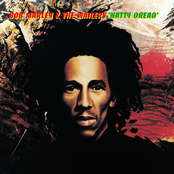Natty Dread

Biography
Natty Dread is a 1974 reggae album by Bob Marley & The Wailers. An important transition in Marley's discography, Natty Dread was the first album released as Bob Marley & the Wailers (as opposed to The Wailers) and the first recorded without former bandmates Peter Tosh and Bunny Wailer. It is also the first album recorded with the I-Threes, a female vocal trio that included Bob's wife, Rita Marley, along with Marcia Griffiths and Judy Mowatt. Natty Dread is a spiritually charged political and s...
Natty Dread is a 1974 reggae album by Bob Marley & The Wailers. An important transition in Marley's discography, Natty Dread was the first album released as Bob Marley & the Wailers (as opposed to The Wailers) and the first recorded without former bandmates Peter Tosh and Bunny Wailer. It is also the first album recorded with the I-Threes, a female vocal trio that included Bob's wife, Rita Marley, along with Marcia Griffiths and Judy Mowatt. Natty Dread is a spiritually charged political and social statement. It opens with a blues-influenced positive celebration of skanking, reggae and sex, Lively Up Yourself, which Marley used to open many of his concerts, in order to get the audience worked up; American R&B star Prince used it for the same purpose. No Woman No Cry, the second track, is probably the best known recording on the album. It is a nostalgic remembrance of growing up in the impoverished streets of Trenchtown, and the happiness brought by the company of friends. The song has been performed by artists as diverse as Boney M. (sung by Liz Mitchell), The Fugees, Pearl Jam, Jimmy Buffett, and Rancid. Songwriting credit for "No Woman, No Cry" went to V. Ford. Ford, better known as Tartar to his friends and neighbors, had been a kind friend of Marley as a child in Trench Town, the ghetto of Kingston, Jamaica. Marley claimed he would have starved to death on several occasions as a child if not for the aid of Tartar. Them Belly Full (But We Hungry) is a warning against allowing a nation's poor to go hungry, with the prophetic warning "a hungry mob is an angry mob" (the song is reportedly dedicated to newly-elected Democratic Socialist Michael Manley), while Talkin' Blues and Revolution go deeper into controversial political commentary. Rebel Music (3 O'Clock Roadblock) is a reflection on the potential impact of reggae music on Jamaican society. The song was written after Marley had been stopped by a night-time police carcheck. The influence of Marley's increasing devotion to Rastafari can be heard in religious-themed songs like So Jah S'eh, Natty Dread and "Lively Up Yourself", while Marley's reputation as a romantic is confirmed with smooth, seductive songs like Bend Down Low. The title track of the album takes its title from an idealised personification of the Rastafari movement, Natty Dread. Jazz Guitarist Charlie Hunter covered the entire album on his 1997 release of the same name. In 1975, this album was mentioned in a few audio magazines as being ready to be released on Quadraphonic 8-track tape. This unfortunately never happened. However, the Quadraphonic mixes of "Lively Up Yourself" and "No Woman No Cry" have been bootlegged from the master tapes and are available on the internet. In 2001, a re-mastered edition of Natty Dread was released by Universal Records containing a bonus track. In 2003, the album was ranked number 182 on Rolling Stone magazine's list of the 500 greatest albums of all time. Song writing credits Although the album's liner notes list multiple songwriters, including family friends and bandmembers, all songs were written by Marley. Marley was involved in a contractual dispute with his former publishing company, Cayman music. Vincent Ford, a childhood friend from Jamacia, was given writing credit for "No Woman, No Cry" on the 1974 album Natty Dread, as well the songs Crazy Baldheads (with Marley's wife Rita), Positive Vibration and Roots, Rock, Reggae from the 1976 album Rastaman Vibration, along with Inna De Red and Jah Bless with Marley's son, Stephen. Marley had not wanted his new songs to be associated with Cayman and it had been speculated, including in his obituary in The Independent, that he had put them in the names of his close friends and family members as a means of avoiding the contractual restrictions and as a way to "provide lasting help to family and close friends". Marley's widow and his former manager Danny Sims sued to obtain royalty and ownership rights to the songs, claiming that Marley had actually written the songs but had assigned the credit to Ford to avoid meeting commitments made in prior contracts. A 1987 court decision sided with the Marley estate, which assumed full control of the songs. Natty Dread peaked at #44 on Billboard's (North America) Black Albums chart, and at #92 on the Pop Albums chart. The first CD issue of Natty Dread featured track mixes that differed on some tracks from those on the original 1974 vinyl release. Read more on Last.fm. User-contributed text is available under the Creative Commons By-SA License; additional terms may apply.

